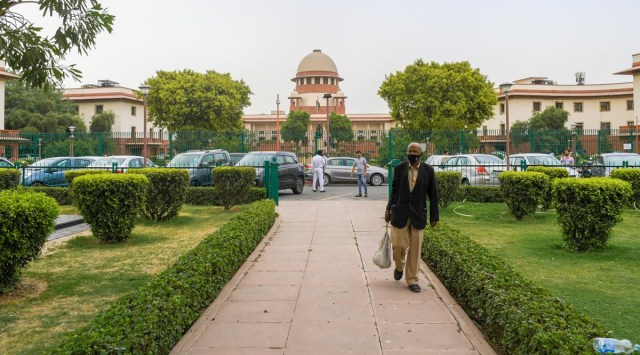File case in every hate speech or we will act: SC to all states, UTs
The Supreme Court said that hate speech was a serious offence that is capable of affecting the secular fabric of country
 The comments were made when the apex court was hearing a batch of cases over inaction by states in acting against instances of hate speech. (Express File Photo)
The comments were made when the apex court was hearing a batch of cases over inaction by states in acting against instances of hate speech. (Express File Photo) The Supreme Court Friday directed all states and Union Territories to register cases on their own against those making hate speeches.
Extending its October 21, 2022 order directing police in Delhi, Uttar Pradesh and Uttarakhand to take suo motu action in cases of hate speech to all states and Union Territories, the bench of Justices K M Joseph and B V Nagarathna said “any hesitation to act in accordance with this direction will be viewed as contempt of court and appropriate action shall be taken against the erring officers”.
It reiterated that “such action will be taken irrespective of the religion that the maker of the speech or the person who commits such act belongs to, so that the secular character of Bharat, as envisaged by the Preamble, is preserved and protected”.
The bench also issued notices to all states and UTs. It issued the order after the petitioner urged the court to also make other states and UT’s parties.
Solicitor General Tushar Mehta and some of the other parties had earlier said that the petitioner was being selective in seeking action against only some and not all states.
Justice Joseph disagreed with the suggestion that hate-speech is an all-India phenomenon.
“When you say it’s a pan-India issue, you take for example northeast… I don’t know if you have this kind of a hate-speech problem in the Northeast… at least not that I know of… It’s very, very isolated… It’s not pan-India. It’s in certain areas. There may be reasons for that,” he told a lawyer.
Justice Joseph said that many a time people may not come forward to complain and “that’s why we said in our interim order that police themselves should take action”. He said“we only had the public good in mind that this should not go out of hand”.
Mehta said “we share that concern in the government. And also across party lines, there would be public good in mind because they are also ultimately elected representatives. But the question is where Your Lordships would draw the line”.
Mehta pointed out that there are now hundreds of applications being filed and the Constitutional court is being requested to take on the duties of a magistrate court.
Justice Joseph said that “irrespective of the number of applications… the need to attend to the problem cannot be decided with reference to the difficulty we have in facing it. We may have to wade through a lot of difficulties. But something close to the heart of any republic which is of… people being treated with dignity, which you also agree”.
Justice Nagarathna, referring to the statement of the petitioner’s counsel Mohammed Nizam Pasha that incident after incident was happening, said, “Exactly, incidents after incidents happening. So whether this court is going to interfere in incident after incident?”
Responding to Justice Joseph’s remarks, Mehta said people may come with their own interests and request the court. He wondered how long can this go on. He said there is power available to a magistrate to order a police investigation under Section 156(3) of the CrPC and asked “would Your Lordships not trust the judges under section 156(3)?”
Justice Joseph said the court feels that the provision may not be adequate. “That may not be adequate… we feel so,” he said.







